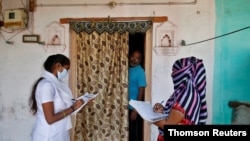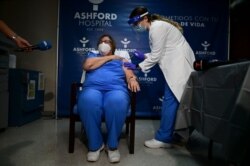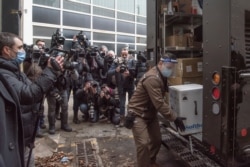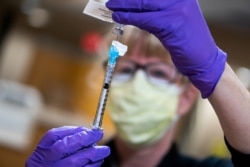While the first shots against COVID-19 are rolling out in the United States, Britain and Canada, nearly a quarter of the world's population likely will not have access to a vaccine until at least 2022, according to a new study.
Even in a best-case scenario, the world does not have the manufacturing capacity to cover the entire global population.
Wealthier countries made deals to buy the bulk of vaccine doses before the shots have even finished testing or received regulatory approval.
Meanwhile, a partnership aimed at securing vaccines for low- and middle-income countries has so far reserved only a fraction of the doses it has promised to deliver.
"Many governments in the poorest parts of the world are very, very concerned about the significant lag of when these vaccines are hitting these wealthy countries ... and when they’ll actually be in developing countries," said Kate Elder, senior vaccines policy adviser at the nonprofit Doctors Without Borders, who was not part of the study.
First arrivals
Last week, pharmaceutical and biotech partners Pfizer and BioNTech began delivering their COVID-19 vaccine in Britain. The first patients in the United States and Canada received their shots on Monday.
A second vaccine from biotech firm Moderna is expected to receive U.S. Food and Drug Administration authorization this week.
The World Health Organization is reviewing these vaccines, along with a third from pharmaceutical company AstraZeneca and Oxford University.
While these and other vaccines were still in clinical trials, countries committed billions of dollars to secure hundreds of millions of doses for their residents.
According to the new study, 13 manufacturers have signed preorder deals for nearly 7.5 billion vaccine doses. Just over half of those preorders are from high-income countries, though they account for less than 14% of the world's population.
Canada has secured enough vaccines to immunize its population nearly five times over, while the United States has reserved just over one vaccine course per person. Brazil and Indonesia have not ordered enough to fully immunize even half their populations.
Uncertainty
According to the study, the leading vaccine manufacturers have said they will have the combined capacity to produce enough vaccines to immunize 6 billion people by the end of 2021.
That means in a best-case scenario, in which every vaccine candidate works and there are no financing shortfalls or manufacturing glitches, supplies would be more than 1.6 billion courses short.
While most of the world's manufacturing capacity will be tied up with preorders next year, up to 40% may still be available for low- and middle-income countries that have not reserved doses, the study says.
However, some of the countries that preordered vaccines have the option to buy more. Because the details of the deals are not public, it is not clear whether those countries would get priority.
"What these agreements between vaccine manufacturers and countries really entail is the uncertainty factor that makes many (other) countries wonder whether or not they will be at the front of the line or the back of the line," said study co-author Anthony So, director of the Johns Hopkins University Innovation+Design Enabling Access (IDEA) Initiative.
With low- and middle-income countries at risk of being left out, WHO helped put together a system, called COVAX, to ensure more equitable COVID-19 vaccine access.
Countries put money into COVAX to support development of several vaccines at once. Since some are likely to fail, backing more than one raises the odds that a country will have access to at least one successful vaccine.
COVAX members get access to enough vaccines for up to 20% of their populations. The organization aims to deliver 2 billion doses by the end of 2021.
At least 184 countries have joined COVAX, including 92 donor-funded, low- and middle- income countries.
Not included
The Pfizer and Moderna vaccines are not part of COVAX.
Some middle-income countries are signing bilateral agreements for these shots outside COVAX, "but this is all done through untransparent backdoor deals," said Elder, of Doctors Without Borders.
As for when these vaccines might arrive in the rest of the world, she added, "I think a lot of us are scratching our heads."
Of the 13 manufacturers that have signed preorder deals, COVAX has agreements with three. That includes 300 million doses from AstraZeneca and 200 million from Novavax, which has a product in late-stage clinical trials.
COVAX also committed to buy 200 million doses of a vaccine from drugmaker-collaborators Sanofi and GSK.
That vaccine suffered a setback Friday, when early data showed it fell short in older adults.
Sanofi and GSK said they are continuing their studies with a reformulated vaccine.







